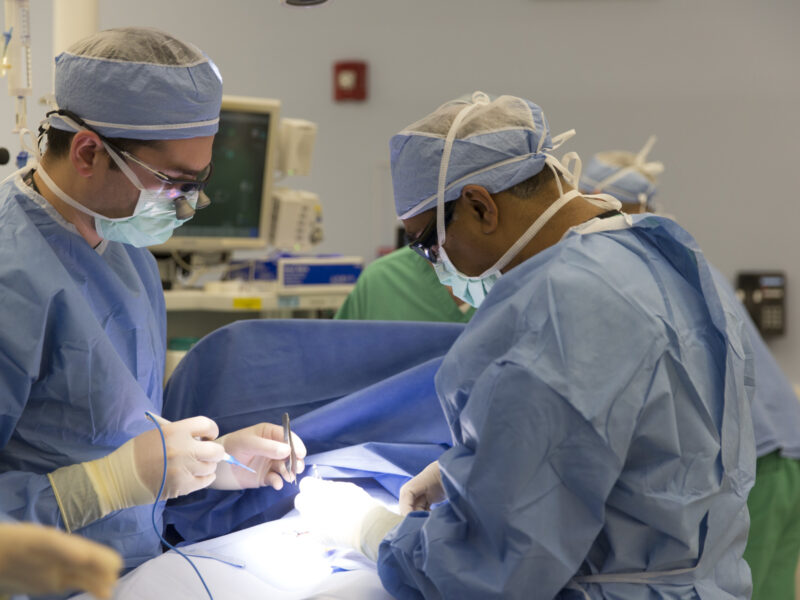Using Antibiotics Alone for Children with Uncomplicated Appendicitis
Using Antibiotics Alone for Children with Uncomplicated Appendicitis https://pediatricsnationwide.org/wp-content/themes/corpus/images/empty/thumbnail.jpg 150 150 Gina Bericchia Gina Bericchia https://pediatricsnationwide.org/wp-content/uploads/2021/03/Gina-Bericchia-2-1.jpg- December 21, 2015
- Gina Bericchia
One year follow-up of patients treated only with antibiotics found that 76 percent avoided surgery.
Using antibiotics alone to treat children with uncomplicated acute appendicitis is a reasonable alternative to surgery when chosen by the family, finds a recent study led by researchers at Nationwide Children’s Hospital.
Three out of four children with uncomplicated appendicitis whose families initially chose an antibiotics-only approach were successfully treated that way. And compared to urgent appendectomy, non-operative management was associated with less recovery time, lower health costs and no difference in the rate of complications at one year.
“These patients avoided the risks of surgery and anesthesia, and they quickly went back to their activities,” says Peter C. Minneci, MD who led the study published online Dec. 16 in JAMA Surgery with Katherine J. Deans, MD. The pair are co-directors of the Center for Surgical Outcomes Research and principal investigators in the Center for Innovation in Pediatric Practice in The Research Institute at Nationwide Children’s.
The researchers enrolled 102 patients age 7 to 17 who were diagnosed with uncomplicated acute appendicitis at Nationwide Children’s between October 2012 and October 2013. Participants had early/mild appendicitis, meaning that they experienced abdominal pain for no more than 48 hours; had a white blood cell count below 18,000; underwent an ultrasound or CT scan to rule out rupture and to verify that their appendix was 1.1 centimeter thick or smaller; and had no evidence of an abscess or fecalith.
Thirty-seven families chose antibiotics alone and 65 opted for surgery. Those patients in the non-operative group were admitted to the hospital and received intravenous antibiotics for at least 24 hours, followed by oral antibiotics after discharge for a total of 10 days. Among those patients, 95% showed improvement within 24 hours and were discharged without undergoing surgery. Rates of appendicitis-related medical care within 30 days were similar between the groups, with two patients in the non-operative group readmitted within 30 days for an appendectomy. At one year after discharge, 76 percent of patients in the non-operative group did not have appendicitis again and have not undergone surgery.
“We believe that the results of our study reflect the effectiveness of offering non-operative management to patients and their families in clinical practice. The patient choice design allows the patient and family’s preference to be aligned with their choice of therapy,” says Dr. Deans.
According to the study, patients who were transferred to Nationwide Children’s from other institutions expressed concerns about the distance and time necessary to come back if the appendicitis recurred. These families opted for surgery more often. Patients whose families spoke primary languages other than English were more likely to choose antibiotics as a course of treatment due to cultural values to avoid surgery if at all possible.
Both researchers, who are also assistant professors of surgery and pediatrics in The Ohio State University College of Medicine, say further studies are needed to see if the results they saw in this study apply in other health systems, and emphasize that the perceptions of both patient-families and surgeons can impact the study results. Their intention is to follow all the children in this study as long as possible to see if those treated with non-operative management continue to thrive.
Reference:
Minneci PC, Mahida JB, Lodwick, DL, Sulkowski JP, Nacion KM, Cooper JN, Ambeba, EJ, Moss RL, Deans KJ. The effectiveness of patient choice in non-operative versus surgical management of uncomplicated acute appendicitis. JAMA Surgery. 2015 Dec 16 [Epub ahead of print].
About the author
Gina is the director of Media Relations at Nationwide Children's Hospital. She has a background in health care public relations. She previously worked at The Ohio State University Wexner Medical Center and is a graduate of Otterbein College.
-
Gina Bericchiahttps://pediatricsnationwide.org/author/gina-bericchia/
-
Gina Bericchiahttps://pediatricsnationwide.org/author/gina-bericchia/
-
Gina Bericchiahttps://pediatricsnationwide.org/author/gina-bericchia/
-
Gina Bericchiahttps://pediatricsnationwide.org/author/gina-bericchia/
- Posted In:
- In Brief








